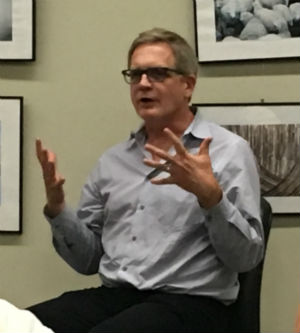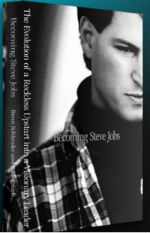‘Becoming Steve Jobs’ Co-Author Speaks in Arlington
 – Allison Goldsberry
– Allison Goldsberry
“He was a rock star, he really was, and it came to him naturally.”
While that sounds like high praise from Becoming Steve Jobs co-author Rick Tetzeli, it’s actually more of a commentary about a man Tetzeli says really evolved over time as a leader. Jobs, often portrayed as impetuous, caustic, and abrasive, was during his second tenure at Apple a master of product launch theater, which cemented his status as a celebrity CEO.
Four years ago this month Jobs passed away from pancreatic cancer. Tetzeli and co-author Brent Schlender began their book three years ago and since then, several films and another book have attempted to drive the narrative of Jobs’ legacy. Walter Isaacson released Steve Jobs only one year after his death and “Steve Jobs,” a movie based on Isaacson’s book, is currently in theaters. “The Man in the Machine,” a documentary by Alex Gibney, came out last month, and in 2013 actor Ashton Kutcher portrayed the Apple icon in “Jobs.”
The Brooklyn-based Tetzeli, Editor at Large of Fast Company, released his book with Schlender in March 2015. He spoke about the book, Jobs’ career, and other related topics during at talk at Arlington High School on Wednesday for an Arlington Community Education event.
According to Tetzeli, Apple was initially reluctant to cooperate for his book. However, as time passed after Jobs’ death, and Isaacson’s book gained traction, they were able to “wear Apple down.” Tetzeli said Apple and others in Silicon Valley didn’t like Isaacson’s book and they hoped Tetzeli and Schlender would get things “less wrong.”
 Tetzeli said Apple had no editorial control over the book. Schlender, his co-author, had known Jobs for many years after first meeting him as a young reporter, which later helped them approach the company for sources. Schlender and Tetzeli decided their book would focus on Jobs’ “growth story,” his evolution of a leader over time. He said Jobs’ growth story is more interesting but isn’t as sexy a story-line as the charismatic jerk who berated people into doing amazing things that has seemingly dominated the public narrative.
Tetzeli said Apple had no editorial control over the book. Schlender, his co-author, had known Jobs for many years after first meeting him as a young reporter, which later helped them approach the company for sources. Schlender and Tetzeli decided their book would focus on Jobs’ “growth story,” his evolution of a leader over time. He said Jobs’ growth story is more interesting but isn’t as sexy a story-line as the charismatic jerk who berated people into doing amazing things that has seemingly dominated the public narrative.
Tetzeli said Jobs changed into an effective leader who was able to accomplish incredible things; he wouldn’t have been able to do this if he was simply a jerk who constantly abused people. Starting with the iPod, Apple made remarkably incremental and consistent progress that revolutionized mobile computing and made Apple the most valuable company in the world.
Tetzeli believes the current Jobs movie, written by Aaron Sorkin, presents only a one dimensional view of the tech titan and doesn’t provide a “realistic sense” of him as a person. The movie is “dressed up” with great dialogue, acting, and music that all seem to further the story-line of the tortured business genius, he said, and the movie’s lack of depiction of Jobs’ family life was a “huge fiction of omission.”
When asked if he liked Jobs, Tetzeli demurred. He had only met him twice, and he said people had to “really be let in” to Jobs’ inner circle to really like him. Tetzeli did say the first five people interviewed for his book cried when discussing their respective histories with Jobs, which supports Tetzeli and Schlenders’ narrative that Jobs evolved into an effective leader who was more than just a tortured, creative soul and controlling, abusive presence. Jobs learned from his mistakes and over time became a “mature” leader that performed in ways that can make a company truly great.
“Personal computing used to be so boring; computers would compete on speed, power,” said Tetzeli.
Jobs knew Apple had “an opening to be different,” and he understood people would use computers as tools for creativity. Jobs’ “big legacies” were being part of the personal and mobile computing revolutions, said Tetzeli.
“We have these super-computers in our hands,” he said, referring to smartphones, and more notably, Apple iPhones.